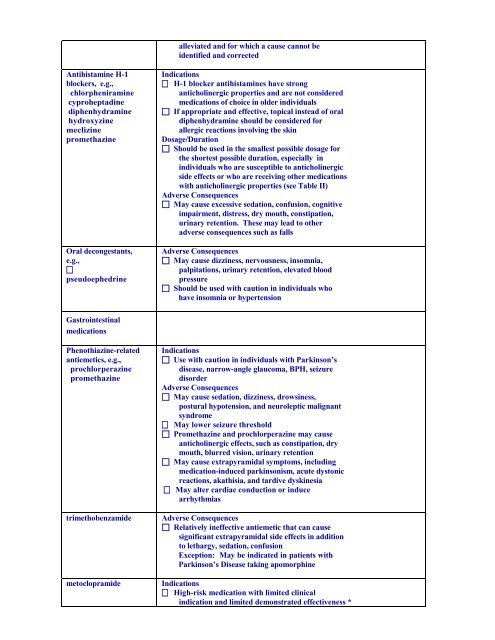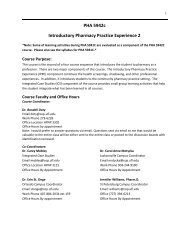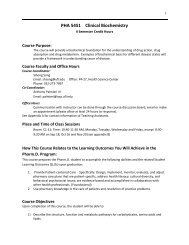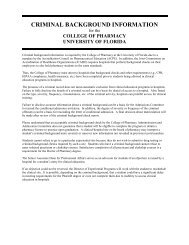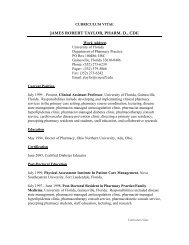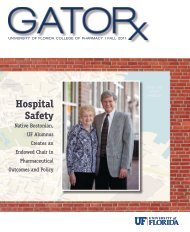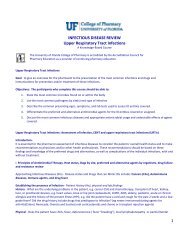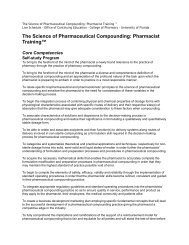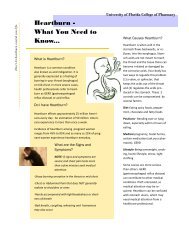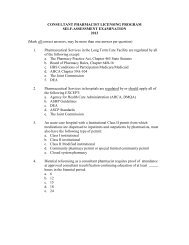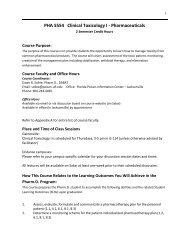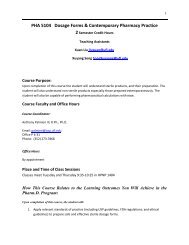Module 3: The Drug Regimen Review - College of Pharmacy ...
Module 3: The Drug Regimen Review - College of Pharmacy ...
Module 3: The Drug Regimen Review - College of Pharmacy ...
You also want an ePaper? Increase the reach of your titles
YUMPU automatically turns print PDFs into web optimized ePapers that Google loves.
Antihistamine H-1<br />
blockers, e.g.,<br />
chlorpheniramine<br />
cyproheptadine<br />
diphenhydramine<br />
hydroxyzine<br />
meclizine<br />
promethazine<br />
Oral decongestants,<br />
e.g.,<br />
<br />
pseudoephedrine<br />
Gastrointestinal<br />
medications<br />
Phenothiazine-related<br />
antiemetics, e.g.,<br />
prochlorperazine<br />
promethazine<br />
trimethobenzamide<br />
metoclopramide<br />
alleviated and for which a cause cannot be<br />
identified and corrected<br />
Indications<br />
H-1 blocker antihistamines have strong<br />
anticholinergic properties and are not considered<br />
medications <strong>of</strong> choice in older individuals<br />
If appropriate and effective, topical instead <strong>of</strong> oral<br />
diphenhydramine should be considered for<br />
allergic reactions involving the skin<br />
Dosage/Duration<br />
Should be used in the smallest possible dosage for<br />
the shortest possible duration, especially in<br />
individuals who are susceptible to anticholinergic<br />
side effects or who are receiving other medications<br />
with anticholinergic properties (see Table II)<br />
Adverse Consequences<br />
May cause excessive sedation, confusion, cognitive<br />
impairment, distress, dry mouth, constipation,<br />
urinary retention. <strong>The</strong>se may lead to other<br />
adverse consequences such as falls<br />
Adverse Consequences<br />
May cause dizziness, nervousness, insomnia,<br />
palpitations, urinary retention, elevated blood<br />
pressure<br />
Should be used with caution in individuals who<br />
have insomnia or hypertension<br />
Indications<br />
Use with caution in individuals with Parkinson’s<br />
disease, narrow-angle glaucoma, BPH, seizure<br />
disorder<br />
Adverse Consequences<br />
May cause sedation, dizziness, drowsiness,<br />
postural hypotension, and neuroleptic malignant<br />
syndrome<br />
May lower seizure threshold<br />
Promethazine and prochlorperazine may cause<br />
anticholinergic effects, such as constipation, dry<br />
mouth, blurred vision, urinary retention<br />
May cause extrapyramidal symptoms, including<br />
medication-induced parkinsonism, acute dystonic<br />
reactions, akathisia, and tardive dyskinesia<br />
May alter cardiac conduction or induce<br />
arrhythmias<br />
Adverse Consequences<br />
Relatively ineffective antiemetic that can cause<br />
significant extrapyramidal side effects in addition<br />
to lethargy, sedation, confusion<br />
Exception: May be indicated in patients with<br />
Parkinson’s Disease taking apomorphine<br />
Indications<br />
High-risk medication with limited clinical<br />
indication and limited demonstrated effectiveness *


